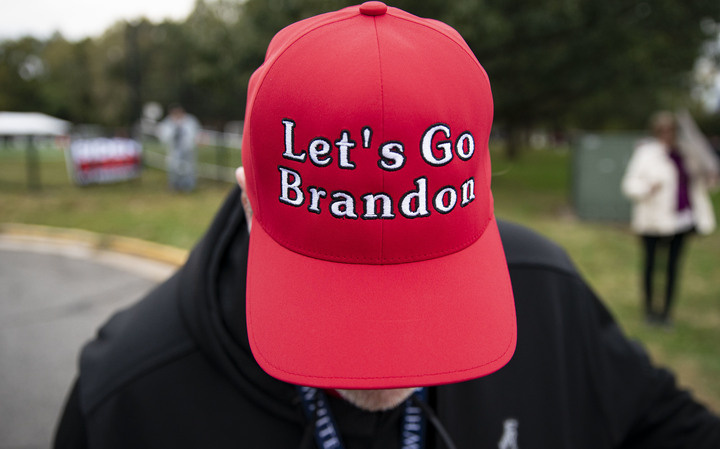Just after President Joe Biden’s remarks on October’s falling unemployment numbers on November 5, the hashtag #ThankYouBrandon briefly was the Number 1 trending topic on Twitter in the US. Supporters of the President used the label to salute the positive results for the Administration in the labor market.
But who is Brandon?
The answer opens up the phenomenon of politics and social media in 21st-century America — and how the “vital center” in the US, let alone Biden’s backers, will struggle to break the grip of right-wing attack activists.
Uttering the F-Word
On October 2, Brandon Brown won NASCAR’s Talladega 500. It was a breakthrough first victory for the 28 year-old driver in stock car racing’s premier competition.
But few will remember that feat. Instead, the event took on new significance when NBC TV’s Kelli Stavast, interviewing Brown, told viewers that the crowd was chanting, “Let’s Go Brandon”.
In fact, they were shouting, “F*** Joe Biden”.
Anti-Biden chants are a feature at conservative rallies. They spread to NASCAR’s races, college football games, and concerts through the summer and autumn, with widespread support on social media. Hashtags of the phrase and acronyms such as #FJB or #FJBMovement are widespread in the comment sections of far-right political commentators and conservative media platforms.
But the insult needed a boost from Brandon.
In a country so careful with its use of the F-word, “F*** Joe Biden” was bound to be limited in its reach. The phrase might be shouted at venues such as football stadia and race tracks, where chants, trash-talking, swearing, and insults are commonplace in the stands. It is a far different matter to bring the vulgarity into the commonplace of daily life. Even with Donald Trump shifting the window of acceptable language, the phrase could only be embraced openly by the hard-right fringe of the political sphere.
Stavast’s faulty hearing and enthusiastic “Let’s Go Brandon” offered the necessary disguise. Now opponents of the President had their rallying F-word cry. They could cast the mainstream media as the real miscreants, claiming that “Fake News” had censored their phrase to protect Biden and the “elite”. At the same time, they could repackage their attacks with a new, visceral slogan, setting aside issues for invective.
A Coalition of the Vulgar
Over the next seven weeks, “Let’s Go Brandon” has been everywhere. In sporting venues, it reached all the way to baseball’s World Series. Rapper Bryson Gray’s “Let’s Go Brandon” song was No.1 on iTunes in the US throughout the last week of October, with 3 other versions of the song appearing in the top 10. There is a viral video of a crowd in a Texas church, in a rally of the “Rewakening America” movement, being egged on by an on-stage speaker to shout the phrase.
The Q-Anon crowd is at televangelist John Hagee’s Cornerstone Church in San Antonio.
They are chanting, “Let’s Go Brandon” from the church pews. pic.twitter.com/pGqUmUXezn
— PatriotTakes 🇺🇸 (@patriottakes) November 14, 2021
The journey to acceptability has reached Capitol Hill. Republican Rep. Jeff Duncan of South Carolina, wore a “Let’s Go Brandon” mask on the House floor, posting a selfie on Instagram. Republican Rep. Bill Posey of Florida signed off an October 21 speech to the House with the phrase. GOP Rep. Lauren Boebert of Colorado, a supporter of the QAnon conspiracy movement, was photographed with Donald Trump and other prominent Republican figures at an America First gala at Trump’s Mar-a-Lago resort on November 4. Her red dress featured a large white “Let’s Go Brandon” inscription.
So the three words have united a broad coalition of Trump supporters, mobilizing his disinformation about the 2020 “stolen election”; Coronavirus conspiracy theorists; political conservatives rejecting Biden’s politics and the man himself; far-right activists; excited sports fans; and online trolls. The coded phrase has democratized this rejection of the President, and eroded respect for the office, by granting political and social acceptability to vulgarity.
“Thank You” Loses Out to “F-You”
With #ThankYouBrandon, Biden’s online supporters tried to rally by appropriating the label and converting insult into endorsement.
They may have won a symbolic victory with the ploy, but it was fleeting. A few hours after reaching the top of Twitter’s trends, the hashtag was gone altogether. The messages of gratitude for Biden, and of the positive economic news, were buried under the latest hashtags organizing commentary.
One of those hashtags was #LetsGoBrandon. For the lesson of bringing the vulgar into the mainstream is not just of social media. In social spaces, from the racetrack to the town hall to the church, large groups of Americans are more than happy to redefine their communities.
Four days after his NASCAR victory, Brandon Brown tried to reappropriate the phrase with his name, defusing the political antagonism.
To all the other Brandon’s out there, You’re welcome!
Let’s go us— Brandon Brown (@brandonbrown_68) October 6, 2021
But whereas he led at the checkered flag at Talladega, the “other Brandon’s” had already left him — and “us” — behind.


Hey Cedric,
No comment?
Bill
The chickens have come home to roost.
After 4 years of non-stop Trump bashing it’s payback time.
I hope Amazon delivers my “lets go Brandon” coffee cups today 4 of them on the way.
Lets go Brandon!!!
Bill